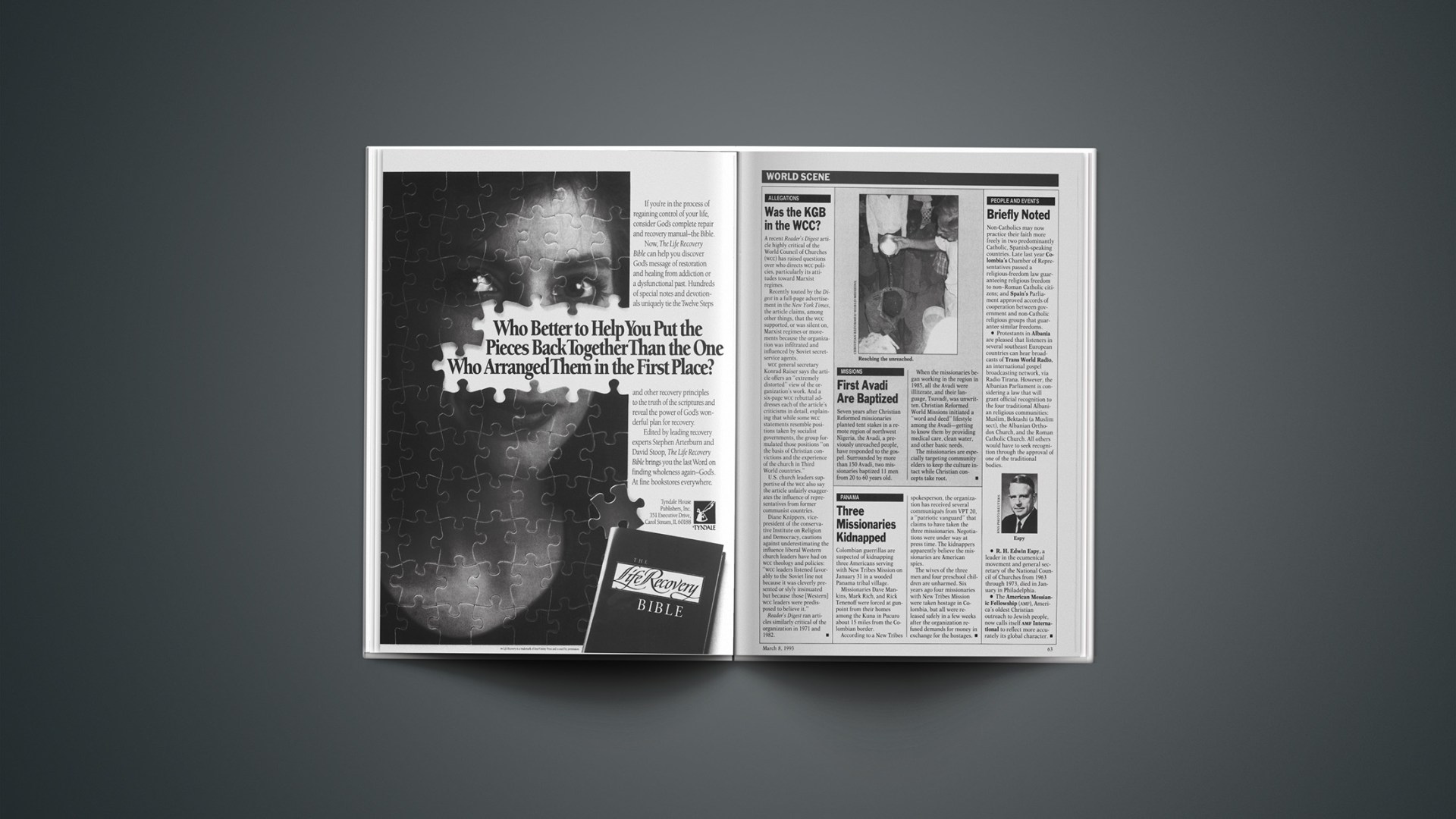ALLEGATIONS
Was the KGB in the WCC?
A recent Reader’s Digest article highly critical of the World Council of Churches (WCC) has raised questions over who directs WCC policies, particularly its attitudes toward Marxist regimes.
Recently touted by the Digest in a full-page advertisement in the New York Times, the article claims, among other things, that the WCC supported, or was silent on, Marxist regimes or movements because the organization was infiltrated and influenced by Soviet secret-service agents.
WCC general secretary Konrad Raiser says the article offers an “extremely distorted” view of the organization’s work. And a six-page WCC rebuttal addresses each of the article’s criticisms in detail, explaining that while some WCC statements resemble positions taken by socialist governments, the group formulated those positions “on the basis of Christian convictions and the experience of the church in Third World countries.”
U.S. church leaders supportive of the WCC also say the article unfairly exaggerates the influence of representatives from former communist countries.
Diane Knippers, vice-president of the conservative Institute on Religion and Democracy, cautions against underestimating the influence liberal Western church leaders have had on WCC theology and policies: “WCC leaders listened favorably to the Soviet line not because it was cleverly presented or slyly insinuated but because those [Western] WCC leaders were predisposed to believe it.”
Reader’s Digest ran articles similarly critical of the organization in 1971 and 1982.
MISSIONS
First Avadi Are Baptized
Seven years after Christian Reformed missionaries planted tent stakes in a remote region of northwest Nigeria, the Avadi, a previously unreached people, have responded to the gospel. Surrounded by more than 150 Avadi, two missionaries baptized 11 men from 20 to 60 years old.
When the missionaries began working in the region in 1985, all the Avadi were illiterate, and their language, Tsuvadi, was unwritten. Christian Reformed World Missions initiated a “word and deed” lifestyle among the Avadi—getting to know them by providing medical care, clean water, and other basic needs.
The missionaries are especially targeting community elders to keep the culture intact while Christian concepts take root.
PANAMA
Three Missionaries Kidnapped
Colombian guerrillas are suspected of kidnapping three Americans serving with New Tribes Mission on January 31 in a wooded Panama tribal village.
Missionaries Dave Mankins, Mark Rich, and Rick Tenenoff were forced at gunpoint from their homes among the Kuna in Pucuro about 15 miles from the Colombian border.
According to a New Tribes spokesperson, the organization has received several communiqués from VPT 20, a “patriotic vanguard” that claims to have taken the three missionaries. Negotiations were under way at press time. The kidnappers apparently believe the missionaries are American spies.
The wives of the three men and four preschool children are unharmed. Six years ago four missionaries with New Tribes Mission were taken hostage in Colombia, but all were released safely in a few weeks after the organization refused demands for money in exchange for the hostages.
PEOPLE AND EVENTS
Briefly Noted
Non-Catholics may now practice their faith more freely in two predominantly Catholic, Spanish-speaking countries. Late last year Colombia’s Chamber of Representatives passed a religious-freedom law guaranteeing religious freedom to non-Roman Catholic citizens; and Spain’s Parliament approved accords of cooperation between government and non-Catholic religious groups that guarantee similar freedoms.
• Protestants in Albania are pleased that listeners in several southeast European countries can hear broadcasts of Trans World Radio, an international gospel broadcasting network, via Radio Tirana. However, the Albanian Parliament is considering a law that will grant official recognition to the four traditional Albanian religious communities: Muslim, Bektashi (a Muslim sect), the Albanian Orthodox Church, and the Roman Catholic Church. All others would have to seek recognition through the approval of one of the traditional bodies.
• R. H. Edwin Espy, a leader in the ecumenical movement and general secretary of the National Council of Churches from 1963 through 1973, died in January in Philadelphia.
• The American Messianic Fellowship (AMF), America’s oldest Christian outreach to Jewish people, now calls itself AMF International to reflect more accurately its global character.










